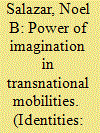|
|
|
Sort Order |
|
|
|
Items / Page
|
|
|
|
|
|
|
| Srl | Item |
| 1 |
ID:
113895


|
|
|
|
|
| Publication |
2011.
|
| Summary/Abstract |
In this introduction, we outline the general conceptual framework that ties the various contributions to this special issue together. We argue for the importance of anthropology to "take on" mobility and discuss the advantages of the ethnographic approach in doing so. What is the analytical purchase of mobility as one of the root metaphors in contemporary anthropological theorizing? What are the (dis)advantages of looking at the current human condition through the lens of mobility? There is a great risk that the fast-growing field of mobility studies neglects different interpretations of what is going on, or that only patterns that fit the mobilities paradigm will be considered, or that only extremes of (hyper)mobility or (im)mobility will be given attention. The ethnographic sensibilities of fieldworkers who learn about mobility while studying other processes and issues, and who can situate movement in the multiple contexts between which people move, can both extend the utility of the mobilities approach, and insist on attention to other dynamics that might not be considered if the focus is first and last on (im)mobility as such. In this special issue, we do not want to discuss human mobility as a brute fact but rather analyze how mobilities, as sociocultural constructs, are experienced and imagined.
|
|
|
|
|
|
|
|
|
|
|
|
|
|
|
|
| 2 |
ID:
113898


|
|
|
|
|
| Publication |
2011.
|
| Summary/Abstract |
At the roots of many travels to distant destinations, whether in the context of tourism or migration, are historically laden and socioculturally constructed imaginaries. People worldwide rely on such imaginaries, from the most spectacular fantasies to the most mundane reveries, to shape identities of themselves and others. These unspoken representational assemblages are powerful because they enact and construct peoples and places, implying multiple, often conflicting, representations of Otherness, and questioning several core values multicultural societies hold, by blurring as well as enforcing traditional territorial, social, and cultural boundaries. What are the contours of power, agency, and subjectivity in imaginaries of transnational mobility and the intersecting social categories those visions both reify and dissolve? Ethnographic studies of human (im)mobility provide an innovative means to grasp the complexity of the global circulation of people and the world-making images and ideas surrounding these movements. As a polymorphic concept, mobility invites us to renew our theorizing, especially regarding conventional themes such as culture, identity, and transnational relationships. This article critically analyzes some preliminary findings of an ongoing multisited research project that traces how prevalent imaginaries of transnational tourism to and migration from the "global South" are (dis)connected. I suggest anthropology has unique contributions to make to the current debate in the social sciences by ethnographically detailing how mobility is a contested ideological construct involving so much more than mere movement.
|
|
|
|
|
|
|
|
|
|
|
|
|
|
|
|
|
|
|
|
|